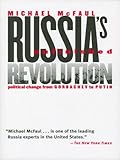Russia's Unfinished Revolution : Political Change from Gorbachev to Putin / Michael A. McFaul.
Material type: TextPublisher: Ithaca, NY : Cornell University Press, [2015]Copyright date: 2015Description: 1 online resource (400 p.) : 10 tablesContent type:
TextPublisher: Ithaca, NY : Cornell University Press, [2015]Copyright date: 2015Description: 1 online resource (400 p.) : 10 tablesContent type: - 9780801456978
- 320.947 22
- DK510.763
- online - DeGruyter
| Item type | Current library | Call number | URL | Status | Notes | Barcode | |
|---|---|---|---|---|---|---|---|
 eBook
eBook
|
Biblioteca "Angelicum" Pont. Univ. S.Tommaso d'Aquino Nuvola online | online - DeGruyter (Browse shelf(Opens below)) | Online access | Not for loan (Accesso limitato) | Accesso per gli utenti autorizzati / Access for authorized users | (dgr)9780801456978 |
Browsing Biblioteca "Angelicum" Pont. Univ. S.Tommaso d'Aquino shelves, Shelving location: Nuvola online Close shelf browser (Hides shelf browser)

|

|

|

|

|

|

|
||
| online - DeGruyter Fat-Talk Nation : The Human Costs of America’s War on Fat / | online - DeGruyter Roads : An Anthropology of Infrastructure and Expertise / | online - DeGruyter Brethren by Nature : New England Indians, Colonists, and the Origins of American Slavery / | online - DeGruyter Russia's Unfinished Revolution : Political Change from Gorbachev to Putin / | online - DeGruyter China's Ascent : Power, Security, and the Future of International Politics / | online - DeGruyter Constructing the International Economy / | online - DeGruyter Site Fights : Divisive Facilities and Civil Society in Japan and the West / |
Frontmatter -- Contents -- Preface -- Acknowledgments -- 1. The Revolutionary Transition from Communism to Democracy: A Model -- Part 1. The Gorbachev Era, 1985–1991 -- 2 . Gorbachev’s Design for Reforming Soviet Political Institutions -- 3. The End of the Soviet Union -- Part 2. The First Russian Republic, 1991–1993 -- 4. Institutional Design in the First Russian Republic -- 5. The Failure of the First Russian Republic -- Part 3. The Emergence of the Second Russian Republic, 1993–1996 -- 6. Designing the Political Institutions of the Second Republic -- 7. Transitional Constitutionalism -- 8. Transitional Electoralism -- Part 4. The Future of Russian Democracy -- 9. The Quality of Russian Democracy -- 10. The Stability of Partial Democracy -- Index
restricted access online access with authorization star
http://purl.org/coar/access_right/c_16ec
For centuries, dictators ruled Russia. Tsars and Communist Party chiefs were in charge for so long some analysts claimed Russians had a cultural predisposition for authoritarian leaders. Yet, as a result of reforms initiated by Mikhail Gorbachev, new political institutions have emerged that now require election of political leaders and rule by constitutional procedures. Michael McFaul traces Russia's tumultuous political history from Gorbachev's rise to power in 1985 through the 1999 resignation of Boris Yeltsin in favor of Vladimir Putin.McFaul divides his account of the post-Soviet country into three periods: the Gorbachev era (1985-1991), the First Russian Republic (1991-1993), and the Second Russian Republic (1993-present). The first two were, he believes, failures—failed institutional emergence or failed transitions to democracy. By contrast, new democratic institutions did emerge in the third era, though not the institutions of a liberal democracy. McFaul contends that any explanation for Russia's successes in shifting to democracy must also account for its failures. The Russian/Soviet case, he says, reveals the importance of forging social pacts; the efforts of Russian elites to form alliances failed, leading to two violent confrontations and a protracted transition from communism to democracy.McFaul spent a great deal of time in Moscow in the 1990s and witnessed firsthand many of the events he describes. This experience, combined with frequent visits since and unparalleled access to senior Russian policymakers and politicians, has resulted in an astonishingly well-informed account. Russia's Unfinished Revolution is a comprehensive history of Russia during this crucial period.
Mode of access: Internet via World Wide Web.
In English.
Description based on online resource; title from PDF title page (publisher's Web site, viewed 26. Aug 2024)


